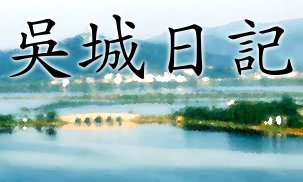吳城日記 translation: Diary of Inner City Suzhou, Part 14
This is Part 14 in an annotation of an extract from 吳城日記 (‘Diary of Inner City Suzhou’). It’s a daily log of Suzhou (specifically the small, walled area in the centre) from the year 1645, a year after the Manchus took Beijing, marking the end of the Ming dynasty and the beginning of the Qing (明末清初).
As always, if you notice a mistake or have any suggestions, please share them in the comments at the end of the page.
[← Part 13](/china/classical/wucheng-riji-13/” rel="prev “吳城日記 translation: Diary of Inner City Suzhou, Part 13”) · Part 14 · [Part 15 →](/china/classical/wucheng-riji-15/” rel="next “吳城日記 translation: Diary of Inner City Suzhou, Part 15”)

兵丁守门稽察,随所取多寡,半留入官,半以与若人。 The soldiers guarded the gates and made inspections; according to how much they got, half was left to go to the government office, and half was given to some people.
脚夫运米一石入城门,给与脚夫一斗。 Porters moved ten _dou_ of rice through the city wall gate, and one _dou_ was given to the porters.
城下拥挤喧闹,兵丁鞭笞交下,人莫敢忤视。 Below the walls it is crowded and noisy, and the soldiers are whipping people to keep them in check, so there are none who dare to disobey.
从十三日始,城中家家闭户,路少行人。 Starting from the thirteenth, every household within the city walls has closed their doors, and there are fewer people on the roads.
其往来于途者,率皆手持枪棍,为守城之伍。 As for those coming and going on the roads, in general they carry spears and staffs, and there are squads protecting the walls.
间有士流及富民,亦皆秃首。 Amongst them are scholar types and wealthy people, and they likewise all have shaved heads.
廿二日,大日晖桥尚有乱民啸聚,城中出兵抄其后,斩获及堕水死者几百人。 22nd: on Great Sunshine Bridge there are still disorderly people gathering and being noisy; within the city walls soldiers went out to attack them from behind; several hundred people were captured and beheaded or fell into the river.
何彼亡命者,自速其毙耶! As for those others who fled, they only hastened their own deaths!
廿三日,令民往上塘栈房取米。 23rd: the people were ordered to go to the storehouses on the embankment to get rice.
强有力者多得之,兼取他货物钱帛。 Those who are strong and forceful got most of it, simultaneously taking other commodities, money and silk.
虚往实归者,络绎在途。 Those who set off empty-handed and come back laden make an unending stream on the road.
廿四日,纵衙役出阊门取米及遗物,民夫亦得随往。 24th: the yamen workers were released to go out of the Chang Gate to get rice and other things left behind, and commoners doing labour service for the government could follow after them.
至山塘栈,有以布裹头之辈潜伏在彼,伤城民数人,乱民亦被杀四人。 They got to the hill embankment store, and there were people with cloth bandannas on their heads lying hidden there; they injured several people from within the city walls and four of the disorderly people also suffered death.
执二人入城,处斩讫。 Two people were captured and taken within the city walls, and they were beheaded.
土公原任总镇都督,至是陞为开府,出示称都察院,将代李公之任矣。 Mr Tu had originally held the post of Regional Commissioner in Chief, but at this point he had been promoted to Commander in Chief; he made an appearance to announce that the General Inspectorate was going to take over Mr Li's responsibilities.
是日,余偶往齐门鼓楼,望见南檐下张帷帐二顶,有两女子坐卧其门,兵丁时揭帷言笑取乐,不知被掳妇其中心惨戚何如也! That day, I happened to go to the Qi Gate Drum Tower, and saw that under the southern eaves were two canopies; there were two women sitting reclining within; at that moment soldiers pulled off the canopies and laughed to amuse themselves; one cannot imagine how aggrieved in their hearts were the women who were set upon!
城内小民候令发票出城取米者,群集以待。 Within the city walls the ordinary people who wait for the issue of tickets to leave the city walls and get rice have gathered in a crowd to wait.
土公适逗留娄门,逮晚不至。 It happened that Mr Tu was tarrying at the Lou Gate, and did not arrive until evening.
齐门,王总捕代为发票,本欲挨图给与,但人众争先,何能一一致询? At the Qi Gate, the ticket issuer worked in place of Chief Sheriff Wang; their original plan was to give them out according to sub-sub-district, but the crowds struggled to be first - how could they be checked one by one?
大约强者得之耳。 In general the strong got them.
吴江因杀县令,不服剃发,发兵往屠。 In Wujiang, because the county magistrate had been killed, they refused to shave their heads, and soldiers were sent there to slaughter them.
是夜兵入城,城中迁者已过半。 That night soldiers entered the city walls, and those shifted inside the city walls were now more than half.
兵丁各以取材为急,人得逃匿,被屠仅数十人。 The soldiers all took the gathering of materials to be urgent; people fled or hid, and only a few dozen people were slaughtered.
复往同里,杀发无算。 Then they went to Tongli, and killed countless numbers.
[← Part 13](/china/classical/wucheng-riji-13/” rel="prev “吳城日記 translation: Diary of Inner City Suzhou, Part 13”) · Part 14 · [Part 15 →](/china/classical/wucheng-riji-15/” rel="next “吳城日記 translation: Diary of Inner City Suzhou, Part 15”)
Series: Diary of Inner City Suzhou
- 吳城日記 translation: Diary of Inner City Suzhou, Part 1
- 吳城日記 translation: Diary of Inner City Suzhou, Part 2
- 吳城日記 translation: Diary of Inner City Suzhou, Part 3
- 吳城日記 translation: Diary of Inner City Suzhou, Part 4
- 吳城日記 translation: Diary of Inner City Suzhou, Part 5
- 吳城日記 translation: Diary of Inner City Suzhou, Part 6
- 吳城日記 translation: Diary of Inner City Suzhou, Part 7
- 吳城日記 translation: Diary of Inner City Suzhou, Part 8
- 吳城日記 translation: Diary of Inner City Suzhou, Part 9
- 吳城日記 translation: Diary of Inner City Suzhou, Part 10
- 吳城日記 translation: Diary of Inner City Suzhou, Part 11
- 吳城日記 translation: Diary of Inner City Suzhou, Part 12
- 吳城日記 translation: Diary of Inner City Suzhou, Part 13
- 吳城日記 translation: Diary of Inner City Suzhou, Part 14 (this article)
- 吳城日記 translation: Diary of Inner City Suzhou, Part 15
- 吳城日記 translation: Diary of Inner City Suzhou, Part 16
